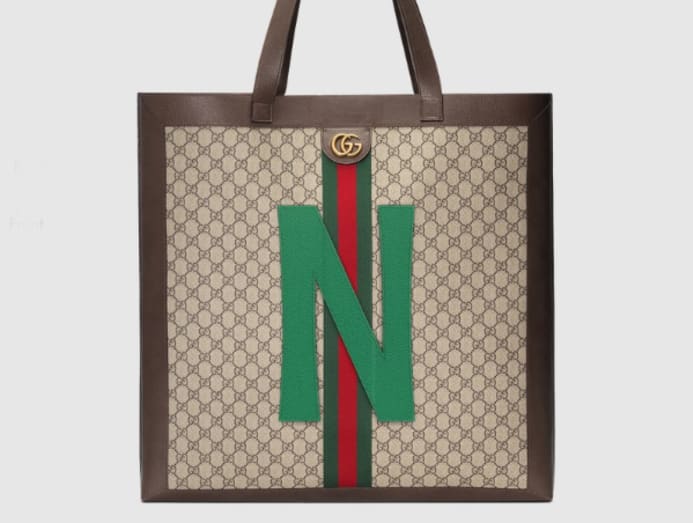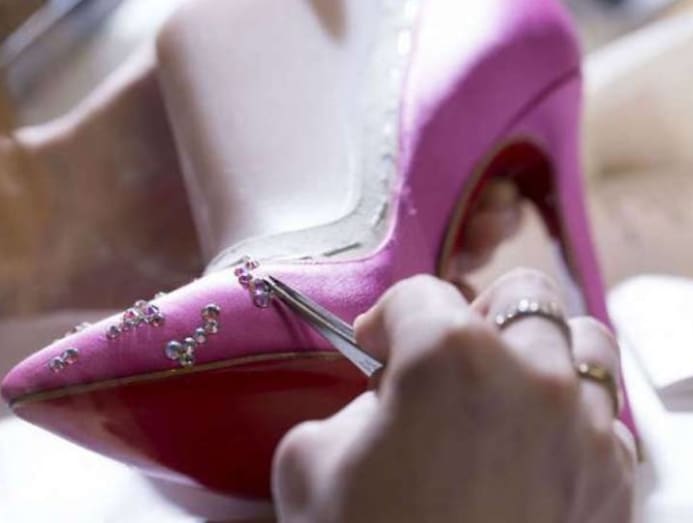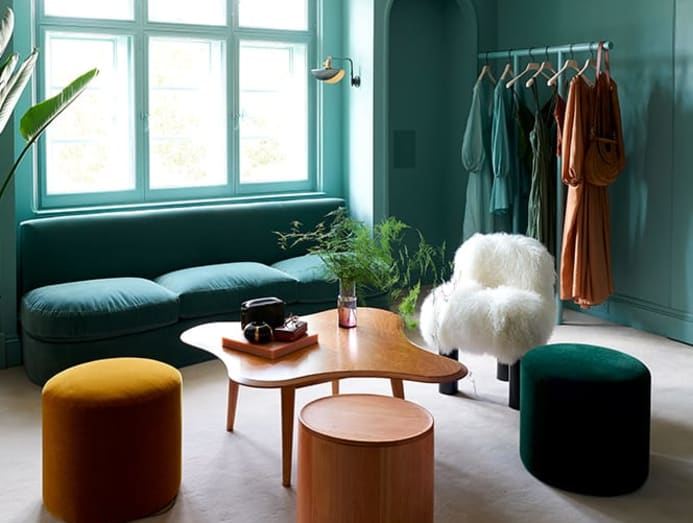Why brands from Burberry to Gucci are increasingly offering personalisation
Tucked abroad off a quaint courtyard near the Louvre in Paris, designer Christian Louboutin and his team work in a secret atelier on their most special fabricated-to-measure out requests. This might be a drove of shoes for burlesque dancer Dita Von Teese'southward latest revue, conjugal pumps to match the cloth of the nuptials clothes, or even like one recent commission, a 100 per cent vegan shoe.
"Bespoke styles have always been something of import to me," Louboutin told the Financial Times. "Information technology's a fashion for me to continue an intimate connection with my clients and to accept direct feedback on how they perceive my work." Last twelvemonth, the designer said, bespoke requests rose past a fifth.

From Gucci's "DIY" service, through which customers can personalise knitwear, tote bags and its Ace sneakers with letters in different colours and materials, to Burberry Bespoke which allows customers to choose the fashion, cloth, colour and hardware of their trenchcoat, brands are increasingly offering personalisation and customisation.
Consumers are demanding information technology equally they seek ways to stand up out from the crowd in a earth where brands are in danger of becoming overexposed through social media and the mass consumption of luxury.
"The return to some degree of production personalisation in luxury is an astute way for brands to offering additional customisation services to a more than discerning clientele while continuing to grow overall volumes, particularly in entry-level categories," said Thomas Chauvet, an analyst at Citi.
READ> Keeping the spirit of i of Hong Kong's about famous bespoke tailors alive
Well-nigh one in five luxury buyers said that customisation, notably made-to-measure out, is relevant to them when they buy luxury products, according to a report last month by the Boston Consulting Group and Altagamma, Italy'south luxury clan.
According to the report, the €330 billion (South$506 billion) personal luxury marketplace grew v per cent terminal yr and is expected to reach €405 billion by 2025. It said that younger generations are more than willing to wait or pay actress for personalised products.

Chauvet said that personalised products typically have a higher margin, "and we expect this segment to grow faster than the overall luxury marketplace, albeit on a relatively limited sales base".
Le Bon Marche, the LVMH-endemic department store in Paris, is devoting more and more space to personalisation, "a crucial and growing area for us," according to Patrice Wagner, its chairman and chief executive.
"There are only and so many people with whom an individual stylist can interact. The bridge between what humans can offering and clients are enervating is data." – Ganesh Srivats, Moda Operandi
Customers tin personalise products from more than than 80 international brands, buying or bringing in clothes or shoes to be jazzed up with stones, studs and sequins, or designing a T-shirt on screen. "Customers want something original and dissimilar," said Wagner. "I don't call back it'due south a passing phenomenon, it's a trend that has substance. The consumer is condign the designer."
Managing the personalisation process can be a challenge, still. Olivier Salomon, a managing director at consulting firm AlixPartners said brands "demand to understand this in the overall context of making and delivering the products, while making sure that information technology doesn't cannibalise their existing business".
Product personalisation is going hand in paw with personalisation of both a client's private feel and their relationship with the brand. "Today with digital and data analytics, brands take the opportunity to have a personalised relationship with everyone, not just their VIP clients and biggest buyers," said Olivier Abtan, a partner at BCG.
READ> The Japanese bespoke shoemaker who doesn't want his creations to stand up out
Francois-Henri Pinault, chairman and primary executive officer of Kering, said at the group'southward annual meeting final month, that "nosotros must customise the dialogue with our clients" and said that the grouping is expanding its utilize of artificial intelligence. Like other brands, Kering is increasingly using AI to personalise the client feel and optimise targeted marketing.
Luxury e-commerce platforms like Yoox Net-a-Porter, Moda Operandi and Matchesfashion.com use tools including data analytics and AI-enabled personal stylists to make recommendations for customers based on their stated preferences, browsing and buying history, too equally based on what other people with a similar profile bought.
"Personalisation is extremely important in this business, only like with Netflix or Spotify," said Ganesh Srivats, main executive officer of Moda Operandi. "There are merely and so many people with whom an individual stylist can interact. The span between what humans can offering and clients are enervating is data."
Srivats added, notwithstanding, that technology-driven recommendations can be "a double-edged sword" because "taken to its logical conclusion consumers would only come across replicas of everything they had already liked or bought. The question is how do yous add together to the sense of the familiar while continually challenging the consumer."

As so-called experiential luxury drives a new era for the industry, the boundaries of bespoke are expanding.
"Personalisation should be about a lifestyle, understanding that it'southward not merely nearly fashion but annihilation that has a value to your life: Art, movie theatre, food, literature," said Ulric Jerome, chief executive of Matchesfashion. Last year the group opened a Mayfair townhouse at 5 Carlos Identify, an experiential retail and result concept that intends to connect online shopping, social media, and sometime-fashioned bricks and mortar.
This month Matchesfashion is launching a collaboration with Pellicano Hotels in Italian republic, in which a 1930s yacht will tour the Mediterranean featuring a 5 Carlos Identify pop-upwards. The cruise will be projected across all the group's platforms via live streams, podcasts and social channels.
"People want to travel with united states of america and be inspired past us," said Jerome. "They desire to be part of the chance. That's what we consider to be full personalisation."
By Harriet Agnew © 2022 The Fiscal Times
READ> What the hereafter of retail looks like for Ion Orchard, according to its CEO
cobbsahmearallood.blogspot.com
Source: https://cnalifestyle.channelnewsasia.com/obsessions/why-luxury-brands-are-increasingly-offering-personalisation-239696
Post a Comment for "Why brands from Burberry to Gucci are increasingly offering personalisation"